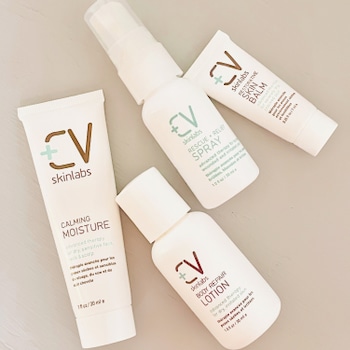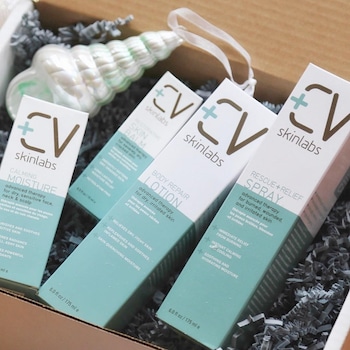
Buy fragrance-free skincare! Avoid synthetic fragrances!
But they smell nice and you feel good when you put them on. Are fragrances really that bad?
Is Fragrance-Free Skincare Required for Healthy Skin?
For many of us, our skincare routines are part of our self-care practices. We slow down and take our time caring for our skin. The process becomes almost meditative in its power to help us relax and feel good about ourselves.
Indulging in a beautifully scented toner or moisturizer can add to that experience, helping us to emerge feeling refreshed and new. Many marketers create products with a variety of fragrances to appeal to those who love to smell good.
It can seem like we’re depriving ourselves if we go completely fragrance-free. You may wonder if it’s really necessary.
It’s all up to you, of course, but below we explain why we believe everyone should avoid synthetic fragrances.
 Why You Should Choose Fragrance-Free Skincare
Why You Should Choose Fragrance-Free Skincare
The problem can be summed up in one word: allergies.
A recent 2019 study of people from four countries—the U.S., Australia, the U.K., and Sweden—found that nearly a third of adults reported fragrance sensitivity. That means they felt adverse health effects from fragranced consumer products.
Commonly reported problems included headaches, skin rashes, respiratory difficulties, and asthma attacks.
The National Eczema Association states that almost a fifth of the population is sensitized to at least one allergen. Fragrance is “one of the most frequently cited substances causing reactions.”
An earlier study reported that fragrances, preservatives, and dyes are the “most important components contained in cosmetics” that cause allergic reactions and hypersensitivity. Fragrance is second only to nickel when it comes to causing allergic contact dermatitis. The American Contact Dermatitis Society (ACDS) naming fragrance as the contact allergen of the year in 2007.
“But I’m not allergic to fragrances,” you may say. “I can use them just fine.”
For now, maybe. But the thing with fragrances is that you can develop a sensitivity to them at any point in your life.
Why You May Need Fragrance-Free Skincare in the Future
According to the U.S. Food and Drug Administration (FDA), “anyone at any age can develop allergies.” This includes allergies to fragrance ingredients.
Indeed, this happens a lot with fragrances. People in their 30s, 40s, and older will suddenly develop rashes, hives, or dermatitis in response to a skincare product and wonder why.
Check the ingredient list. If you see “fragrance,” that could be the culprit.
“It’s as if the human body, after living a lifetime of exposure, can no longer deal with it,” Dr. Roy Fox, director of the Nova Scotia Environmental Health Centre, told Best Health Magazine.
What happens is that after a time, the immune system changes. It begins to see the fragrance ingredients as dangerous invaders that must be eradicated. No one knows why this change may occur. We do know that fragrance is one of the most common causes of later-onset skin allergies and reactions.
Skincare That’s Not Fragrance-Free May Also Contain Phthalates
Here’s another problem with fragranced skincare: it often contains phthalates.
This is a group of chemicals that have been linked to numerous health issues, including:
- reproductive problems
- hormone disruption
- allergies
- diabetes
- asthma
- sometimes, even cancer
Manufacturers may include phthalates in their skin care products to allow the product to cling better to the skin. That means the fragrance will last longer.
Products that may contain phthalates include:
- fragranced lotions
- fragranced body washes
- color cosmetics
- nail polish
- hair-care products
You can tell if your product contains phthalates by looking for the following on the label:
- DEP
- DBP
- DEHP
- Fragrance
The Problem with Skincare That’s Not Fragrance-Free
If you see the word “fragrance” on the ingredient list, it means one thing: the manufacturer is keeping the ingredients in that fragrance secret.
Companies are allowed to protect their fragrance formulas as “trade secret.” That means they don’t have to tell you what chemicals they used to create that lovely scent.
Companies do this to protect their proprietary fragrance blends, so that the Walmart brand can’t rip off the Chanel perfume, for instance.
But the rule leaves consumers in the dark.
It may look from the word “fragrance” that there’s only one additional ingredient there. In truth, it’s more likely a blend of many ingredients.
About 5,000 fragrance molecules are in use today in the cosmetic industry. You’ll never know which ones are being used in the product you’re putting on your skin.
Worse, many synthetic (laboratory-made) fragrance chemicals are derived from petroleum and may have evidence linking them to health effects like allergies and sensitivities.
 What About Products with Fragrances from Natural Ingredients?
What About Products with Fragrances from Natural Ingredients?
Some cosmetics are using natural products now, like essential oils, to scent their products. While this is preferable to synthetic fragrances, we now know that some sensitive people can develop allergies to natural fragrances too.
Research has shown that even natural aromatic oils—which used to be seen as harmless compared to synthetic perfumes—may cause allergic reactions in some people. In a 2009 study, scientists found that these oils may interact with the acid mantle on the skin and with the air in a way that can lead to sensitivity in some cases.
Some of the natural extracts that can cause allergic reactions in some people include:
- Citrus oil extracts like citrus Limonum and citrus bergamia
- Rose flower oil
- Lemongrass
- Balsam of Peru
- Cinnamon bark
- Tea tree
- Sandalwood
- Clover
- Jasmine absolute
- Oakmoss absolute
- Cedarwood
Of course, a person can be allergic to any essential oil. But scientists have identified some as more likely to cause reactions.
CV Skinlabs Products are Fragrance-Free
At CV Skinlabs, all of our products are fragrance-free and unscented. We included no ingredients for the purpose of creating a scent.
Our products do contain some plant and flower extracts because of their therapeutic properties, like the ability to calm and protect the skin. Some of these may leave behind a light scent.
Our cucumber extract, for example, used to help cool skin and reduce inflammation and irritation, may have a slight fresh scent to it.
We checked each of these ingredients against current scientific databases for allergic reactions before including them in our solutions. We were very careful to make sure that our formulas were as non-allergenic as possible.
In general, natural fragrances are much less likely to cause an allergic reaction than synthetic fragrances. If you are extra sensitive to certain essential oils or extracts, however, it’s important to read labels to protect yourself.
How to Shop for Fragrance-Free Skincare
To avoid fragrances, follow these tips:
- Look for “fragrance-free” on the label.
- Check the ingredient list. If you see the words, “fragrance, perfume,” or something similar, that means there are likely unknown chemicals in the product that could cause an allergic reaction.
- Understand that the words “fragrance-free” and “unscented” mean different things. If you see fragrance-free on the label, that means the manufacturer added no chemicals to the formula to enhance aroma or mask an odor. Unscented means the product lacks a scent but may have chemicals masking fragrances to eliminate the odor.
- If you are sensitive to certain natural oils, make sure the products you buy don’t contain those oils.
- Before you try a new product, perform a patch-test on a small area of skin on your arm to be sure your skin doesn’t react to it.
Do you look for fragrance-free when you’re shopping for skin care?

